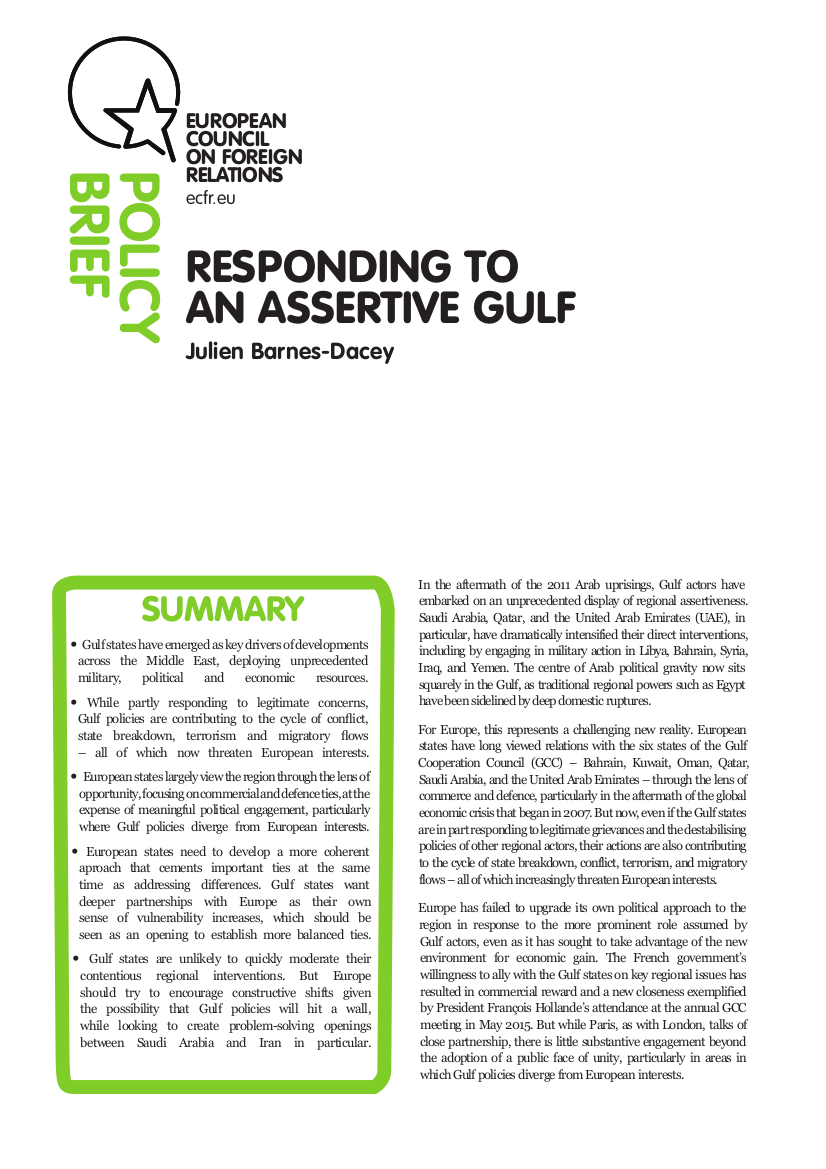Responding to an assertive Gulf
Europe’s relationships with the six Arab Gulf states that make up the Gulf Cooperation Council (GCC) have failed to keep up with their increasing importance
Europe’s relationships with the six Arab Gulf states that make up the Gulf Cooperation Council (GCC) have failed to keep up with their increasing importance as regional powers, hampering Europe’s ability to tackle the threats posed by violent instability, including terrorism and the migration crisis.
In the aftermath of the 2011 Arab uprisings, the six GCC states, but notably Qatar, Saudi Arabia and UAE have dramatically increased their assertiveness across the Middle East, engaging in unprecedented military, political and economic interventions.
But despite this increased significance the EU and its member states continue to look at the Gulf States through the lens of opportunity, focusing on deepening commercial and defence ties. While France, in particular, talks of close partnership, there is little substantive political engagement beyond the adoption of a public face of unity, particularly in areas in which Gulf policies diverge from European interests.
European states should now think about developing a more coherent approach towards the region that can cement important ties at the same time as addressing differences. For all Europe’s weaknesses, the Gulf States still look upon it as a key global partner, particularly as their own sense of vulnerability deepens – so Europe has some levers of potential influence, which it should not ignore.
As Europe’s leaders gather to discuss responses to the migration crisis at the European Council meeting (25-26 Jun), “Responding to an assertive Gulf” recommends a number of measures for better co-ordination with the Gulf states to take on shared regional challenges,
- high-level political dialogue on the key regional issues that shape the region, including a willingness to outline differences. France is currently best placed to cultivate this dialogue but the UK and Germany are also in a position to engage on this
- a new vehicle for engagement on a pan-European basis, potentially revitalising the increasingly defunct EU-GCC ministerial gathering. The EU’s High Representative (HR) for Foreign Affairs should consider establishing an ongoing and high-level HR+E3 consultative forum with the Gulf
- better cooperation with Gulf actors on regional problem solving. This may not translate into immediate gains in terms of Gulf States moderating their more contentious interventions. But Europe should look to encourage constructive shifts given the possibility that the Gulf States’ current policies may eventually hit a wall (as may now be occurring in
- efforts to use the relative closeness of European relations with both Saudi Arabia and Iran to create problem-solving openings. Europe should not be taking sides in this struggle; it should be thinking about how to segue an Iran nuclear deal into a broader regional engagement, reassuring and supporting GCC States but not “compensating” them in counterproductive ways
Julien Barnes-Dacey, Senior Policy Fellow at ECFR and author of “Responding to an assertive Gulf”, said:
“European states have long viewed relations with the six Gulf Cooperation Council States through the lens of commerce and defence. But the actions of these states are now contributing to the cycle of state breakdown, conflict, terrorism, and migratory flows – all of which increasingly threaten European interests.
“It is time for Europe to step up and adopt a new approach that cements important ties at the same time as addressing differences. Europeans cannot expect to shift Gulf policies overnight. But the more European interests are affected and the more that Gulf States realise the limitations of their new-found assertiveness, the greater the space for a more constructive EU-Gulf relationship.”
The European Council on Foreign Relations does not take collective positions. ECFR publications only represent the views of their individual authors.



